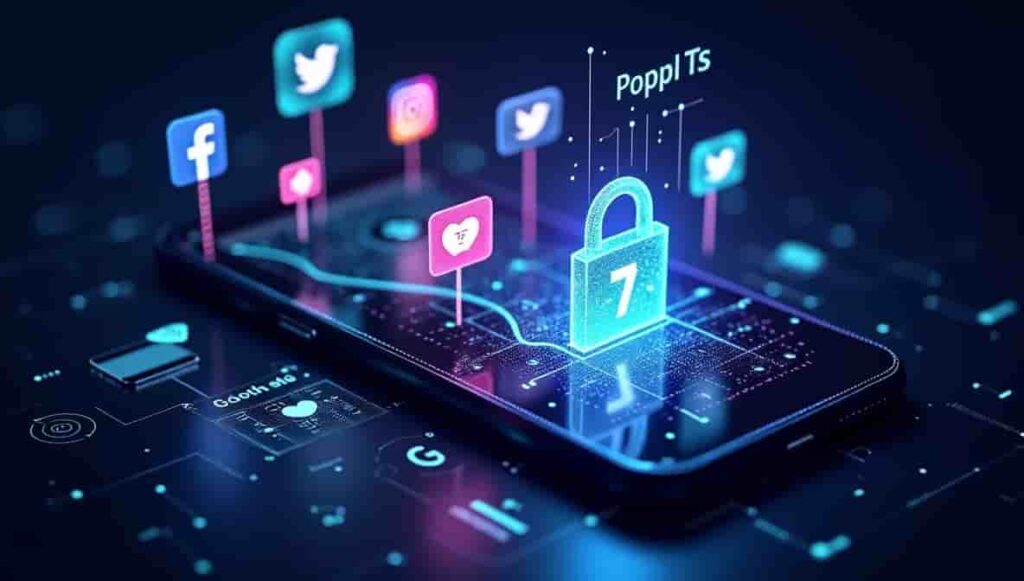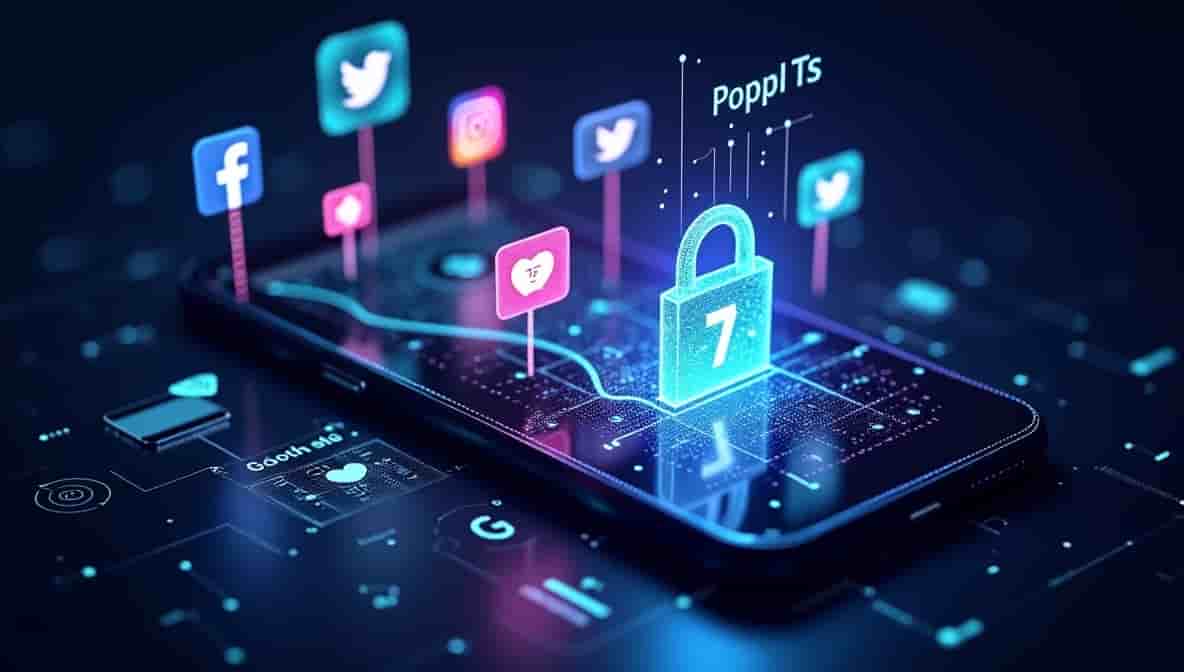Did you know that over 1.5 million social media accounts are hacked every single day worldwide?
Yes, you read that right. And in 2025, with our lives revolving around smartphones more than ever, the risks are multiplying.
The scary part? Most users have no idea how much personal data they’re exposing every time they scroll, post, or even charge their phone in public. From phishing scams to malicious apps, cybercriminals are inventing new tricks daily.

But here’s the good news: you don’t need to be a cybersecurity expert to stay safe.
This guide reveals 15 practical, easy-to-follow secure mobile habits that can protect your social media accounts, personal data, and privacy. Follow these best practices, and you’ll drastically reduce your chances of falling victim to cybercrime in 2025.
15 Secure Mobile Habits You Must Know Before Using Social Media
Why Mobile Security Matters More Than Ever in 2025
Our smartphones have become more than just communication devices — they are digital vaults. Inside them, we store banking details, work files, personal photos, and access to all our social media platforms.
But here’s the catch:
- Hackers don’t just target big corporations anymore. Everyday users are the easiest prey.
- Malware apps disguised as “fun social media tools” are stealing data silently.
- Free public Wi-Fi spots are breeding grounds for account hijackers.
In short, your phone is a goldmine for cybercriminals. Protecting it is no longer optional — it’s survival.
Habit 1: Always Update Your Mobile OS & Social Apps
Updates may feel annoying, but skipping them is like leaving your front door unlocked. Operating system updates patch vulnerabilities that hackers actively exploit.
- Example: In 2023, an outdated Instagram app was exploited by attackers to take over thousands of accounts within days.
- Always set your device and apps to automatic updates.
- Delete apps you don’t use — they may still carry vulnerabilities.
Pro Tip: Updates don’t just add new emojis. They seal security holes before hackers crawl in.
Habit 2: Use Strong, Unique Passwords & Password Managers
Still using your birthday as a password? Stop. In 2025, hackers use AI to crack weak passwords in seconds.
- Every account needs a unique, complex password (mix of letters, numbers, and symbols).
- A password manager like 1Password, Bitwarden, or LastPass can generate and store them securely.
- Never reuse the same password across multiple accounts.
Scenario: If your Facebook password leaks in a data breach, hackers will try it on your email, bank, and Instagram too. A password manager prevents this chain reaction.
Habit 3: Enable Two-Factor Authentication (2FA)
Passwords alone are not enough anymore. Two-factor authentication (2FA) adds a second layer of defense.
- Use app-based 2FA (Google Authenticator, Authy) instead of SMS codes (which can be intercepted).
- Always enable it on your email and social media accounts first — they’re prime hacker targets.
- Yes, it adds an extra step at login, but it can save your account from being hijacked.
Fact: Over 90% of account breaches could have been prevented if 2FA was enabled.
Habit 4: Watch Out for Phishing Links & Fake Apps
Cybercriminals don’t need to hack your phone — they can trick you into handing over access.
- Avoid clicking on suspicious links in DMs, emails, or comments.
- Only download apps from official app stores.
- Check app reviews and developer information before installing.
Example: Fake “Instagram growth booster” apps have stolen login credentials from thousands of creators.
Pro Tip: If it sounds too good to be true, it’s probably a scam.
Habit 5: Review App Permissions Regularly
Most people click “Allow” without thinking. That’s how apps end up tracking your location, microphone, and camera 24/7.
- Go to your phone’s settings → permissions → review every app.
- Revoke access that isn’t essential (e.g., why does a photo-editing app need your location?).
- Restrict background data access for apps that don’t need it.
Remember: your data is currency. The less you give away, the safer you are.
Habit 6: Use a Secure Wi-Fi or VPN
Free café Wi-Fi may save you data, but it could cost you your account. Hackers love unsecured networks.
- Avoid logging into social media on public Wi-Fi.
- If you must, always use a trusted VPN (Virtual Private Network).
- VPNs encrypt your traffic, making it nearly impossible for snoopers to steal your data.
Scenario: Imagine posting on Instagram from airport Wi-Fi — and the next day, your account is locked. That’s how fast it can happen.
Habit 7: Avoid Public Charging Stations (Juice Jacking Threat!) ⚠️
Here’s the shocking one: charging your phone at a public USB station could compromise your data.
This is called juice jacking. Hackers install malicious hardware inside public charging ports that transfer malware or steal information when you plug in.
- Always carry your own charger and plug into a wall outlet.
- Use a USB data blocker if you must charge in public.
- Better yet, carry a power bank.
Warning: That “free charging station” at the mall could secretly drain more than your battery.
Habit 8: Log Out from Social Media on Shared Devices
Using a friend’s phone or public computer to check your account? Always log out.
- Many people forget, leaving accounts accessible to strangers.
- Enable login alerts so you’re notified when a new device accesses your account.
- Never save passwords on shared devices.
A single forgotten logout can expose your entire digital life.
Habit 9: Encrypt Your Mobile Storage
If your phone is lost or stolen, encryption ensures that no one can read your data without your passcode.
- Most modern smartphones have built-in encryption. Just enable it in settings → security.
- Use a strong device PIN or biometric lock.
- Without encryption, thieves can simply connect your phone to a computer and access your files.
Think of encryption as a vault door for your personal data.
Habit 10: Customize Privacy Settings in Social Media Apps
Social media platforms love default settings that maximize data collection.
- Regularly review your privacy settings.
- Limit who can see your posts, stories, and location.
- Disable location tagging on photos.
Example: Criminals have tracked users’ real-time movements via public Instagram stories. Don’t let that happen to you.
Habit 11: Avoid Oversharing Personal Information
What you share today could be used against you tomorrow.
- Don’t post your full birthdate, home address, or travel plans publicly.
- Cybercriminals use these details to answer security questions or impersonate you.
- Even seemingly harmless posts (like your pet’s name) can give clues to your passwords.
Oversharing is a hacker’s dream. Share smart, not blindly.
Habit 12: Install Trusted Security Apps Only
Not all security apps are actually secure. Some are malware in disguise.
- Stick to well-known antivirus and security tools like Norton, McAfee, or Avast.
- Avoid “free cleaner” or “battery booster” apps that request excessive permissions.
- Check reviews and ratings before installing.
When it comes to security, free isn’t always safe.
Habit 13: Back Up Data Securely
Losing your phone shouldn’t mean losing your memories or access.
- Use cloud backups with encryption enabled (Google Drive, iCloud, OneDrive).
- Back up photos, contacts, and important documents regularly.
- Keep at least one offline backup (external drive) for extra safety.
A backup is your insurance policy against theft, hacks, or accidental damage.
Habit 14: Recognize Social Engineering Attacks
Hackers don’t just use tech — they manipulate humans.
- Be wary of strangers asking for “urgent help” or pretending to be support staff.
- Never give login codes or personal info over chat or calls.
- Always verify identities before responding.
Case: Countless influencers have lost accounts after falling for fake “Instagram support” DMs.
Social engineering is sneaky — awareness is your shield.
Habit 15: Teach Your Family & Friends Secure Mobile Habits
Your security chain is only as strong as its weakest link. If your loved ones are careless, you’re still at risk.
- Teach them about phishing, strong passwords, and 2FA.
- Encourage them to update devices and apps.
- Share this checklist with them.
Because protecting yourself also means protecting your circle.
Real-World Case Studies
- In 2024, a viral TikTok challenge led thousands to download a fake “filter app”, which stole login credentials.
- A college student lost her Instagram after logging in via café Wi-Fi — hackers used her session cookies to hijack the account.
- A family vacation was cut short when thieves robbed their home after seeing real-time posts of their trip.
These incidents aren’t rare — they happen daily.
Quick Checklist: Top Secure Mobile Habits
✅ Keep apps and OS updated
✅ Use strong, unique passwords
✅ Enable 2FA everywhere
✅ Avoid phishing links & fake apps
✅ Review app permissions
✅ Use VPN on public Wi-Fi
✅ Avoid public charging stations
✅ Log out from shared devices
✅ Encrypt your phone
✅ Customize social media privacy settings
✅ Don’t overshare personal info
✅ Install trusted security apps only
✅ Back up data securely
✅ Watch for social engineering
✅ Teach loved ones safe mobile habits
Conclusion: Stay Safe Before It’s Too Late
Mobile security in 2025 isn’t optional — it’s survival. Hackers are evolving, but so can you.
By practicing these 15 secure mobile habits, you’re not just protecting your phone — you’re protecting your identity, your finances, and your peace of mind.
Don’t wait until your account gets hacked. Start today. Share these tips with your friends and family.
👉 Your privacy is priceless — defend it like your life depends on it.
FAQ: Mobile Security & Social Media Safety
1. Is it safe to use public Wi-Fi for social media?
Not without protection. Always use a trusted VPN to secure your connection.
2. What’s the best free password manager?
Bitwarden is one of the most recommended free options for 2025.
3. How can I tell if an app is fake?
Check developer details, reviews, and permissions. If it looks suspicious or promises unrealistic features, avoid it.
4. Do I really need 2FA if I have strong passwords?
Yes. 2FA adds an extra layer of protection even if your password leaks.
5. What should I do if my account gets hacked?
Immediately change your passwords, enable 2FA, report the breach to the platform, and scan your device for malware.
6. Are VPNs legal and safe?
Yes, VPNs are legal in most countries and provide strong encryption for online security.
7. Should kids also follow these secure mobile habits?
Absolutely. Teaching children about mobile safety early can prevent cyber risks later.

Dilip Chouhan is a passionate content creator from Rajasthan, India. At 22, he has successfully completed his graduation and is dedicated to sharing valuable knowledge and insights through his writing. With a focus on delivering informative, engaging, and reader-friendly content, Dilip aims to help his audience stay updated, inspired, and empowered.
